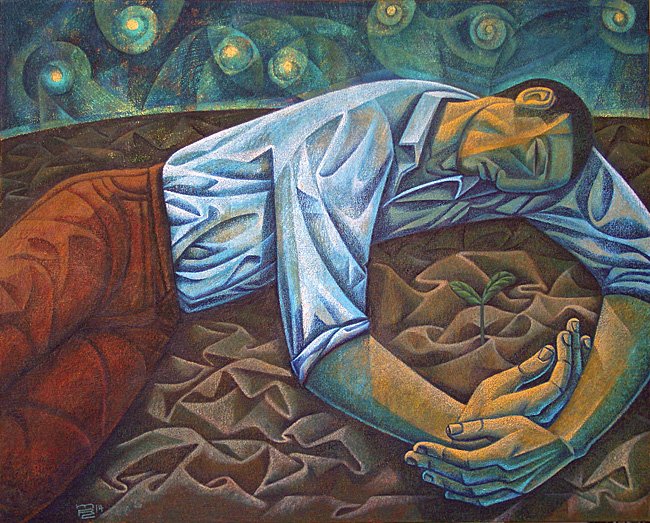Rend Your Heart, by Jan Richardson
“For six years you are to plant and harvest crops on your land. Then during the seventh year, do not plow or plant your land. If any food grows there, allow the poor to have it. And let the wild animals eat what is left. You should do the same with your vineyards and your orchards of olive trees"
Exodus 23:10,11
Day 24 : Lean in and Learn | Creation Care
What does creation care have to do with the vulnerable?
Broken creation care affects peoples' lives in many negative ways. This passage in Exodus reveals biblical ethics that takes into account the fact that even in a pre-industrial agricultural society, creation depletes, gets damaged, and must be tended and allowed to renew. Additionally, in the blueprint for society that God gives his people, there is also intentional and proactive care for the poor. The impact of creation groaning (Romans 8), in our times, reaches so much further.
It is clear to all that natural disasters and extreme weather disproportionately impact the poor and most vulnerable. These effects include internal displacement, food and water insecurity, global health crises, and economic inequality. These populations are often forced to live in areas with high pollution and-or poor infrastructure that leave them vulnerable to property damage, illnesses, food insecurity, and other issues that result from inequity in the face of natural disasters.
"The Lord’s love fills the earth. The sky was made at the Lord’s command.
By the breath from his mouth, he made all the stars."
– Psalm 33:5,6
For example:
A study on poverty and disasters in the US conducted by the University of Colorado found that people of low socioeconomic status are at greater risk of hazards and damage due to the poor construction of the low-income housing units they occupy. Greater risk of fires, of exposure to hazardous materials, degradation of building products that are old and need refurbishing become common..
Now think about those experiencing homelessness whose wages are insufficient to afford them stable and safe housing. Where are they to go in the face of disaster, and how are they to get there? Hard freezes and extreme heat compromises their ability to thrive as they have no shield from debilitating conditions.
Chemical degradation is the dominant cause of soil-degradation in Mexico. Soil degradation is one of the major threats to ecosystem conservation worldwide, because it reduces the soil potential for food production and leads to desertification and soil erosion. The loss of soil fertility reduces the ability to grow crops, and over time only the wealthy are able to access high quality produce.
Let's talk about flood zones. Years of research and evidence from storms have highlighted social inequalities in areas with a high risk of flooding. Moreover, we have less understanding of the social and demographic composition of communities that experience flood impacts outside of flood zones.
Ministries like Austin Disaster Relief Network in Austin,Texas, respond to flood (and other) disasters and offer "physical, emotional, and spiritual support to disaster survivors to meet short and long-term needs." Anglican Relief and Development Fund, our partner organization, responds with relief care for all of North America. Imagine what might be possible if churches stepped into prevention of these kinds of vulnerabilities to disaster.
Night Prayer, by Michael Cook
"God intends...our care of Creation to reflect our love for the Creator."
– John Stott
To offer hope: in Canada, Christians are engaged in habitat restoration which is an "intentional activity that initiates or accelerates the recovery of an ecosystem related to its health, stability and sustainability." *
Restoration activities can include:
Control of introduced, invasive species of plants or animals.
Assisted re-vegetation/re-establishment of native species.
Control, reduction or elimination of specific adverse impacts such as polluted run-off.
Re-establishment and/or increasing complexity of habitat structures including physical, biological or chemical composition. This may include acts like the addition of in-stream wood and rocks, or moving the stream altogether.
Churches and communities such as small groups can get involved in this work in each city or town. There is a restoration for the common good that Christians have always been a part of. But even on the property of a parish this work can happen (e.g. growing gardens, removing invasive species, planting pollinators), so it can be a both-and effort:
Caring for one's own place of worship...
while also reaching out and caring for every part of our communities that may or may not know that their land – and their souls – need the life and light of the Creator,
healing and mending the place and space in which we all live,
as well as our hearts and minds with tangible gospel practices
Christian organizations like *AROCHA help followers of Christ engage these topics faithfully.
As followers of Jesus, we embrace and act responsibly to care for God’s earth while we reaffirm the important truth that we worship only the Creator and not the creation. Christians acknowledge creation care as an act of discipleship; we are stewards of the earth, summoned by God to “work it and take care of it” (Genesis 2:15).
"Our uses of the earth must be designed to conserve and renew it rather than to deplete or destroy it. We pay special attention to protecting human health and protecting the most vulnerable."
– National Association of Evangelicals



